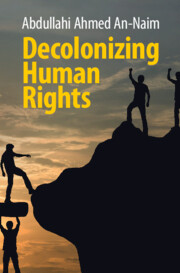Book contents
- Decolonizing Human Rights
- Decolonizing Human Rights
- Copyright page
- Contents
- Preface
- Acknowledgments
- 1 Evolution of Founding Vision
- 2 Marriage of Futility
- 3 The Deadly Mirage of “Humanitarian Intervention”
- 4 People-Centric Protection of Human Rights
- 5 Human Rights Are the Measure of Our Humanity
- References
- Index
4 - People-Centric Protection of Human Rights
Published online by Cambridge University Press: 02 December 2021
- Decolonizing Human Rights
- Decolonizing Human Rights
- Copyright page
- Contents
- Preface
- Acknowledgments
- 1 Evolution of Founding Vision
- 2 Marriage of Futility
- 3 The Deadly Mirage of “Humanitarian Intervention”
- 4 People-Centric Protection of Human Rights
- 5 Human Rights Are the Measure of Our Humanity
- References
- Index
Summary
In this chapter I will highlight and explain how, by their nature and practice, cultural transformation and political mobilization are already the means for sustainable social and political change for all societies relative to their own context. This does not mean that the nature and outcome of social and political change is the same in all societies. Rather, the point for this book is that the manner and process of transformation and mobilization for each society happens on its own terms in relation to its own history and context. Societies can neither be “tricked” nor “coerced” into accepting ethical or cultural change or submitting to whatever political mobilization seems to produce at the time. The outcome of these processes may not be to our liking or satisfaction, but we all have the tools and opportunity to join and attempt to influence the outcome of these processes. The emphasis on the human agency of people in their communities and through socially appropriate strategies reflects the interaction of ends and means in the protection of human rights by human beings in their communal context. The only way for sustainable defense of human rights is through cultural transformation of underlying values and political mobilization for the political will to defend these rights. This is also the only means to experience the responsibility of defending these rights by themselves in their own experience.
- Type
- Chapter
- Information
- Decolonizing Human Rights , pp. 81 - 101Publisher: Cambridge University PressPrint publication year: 2021



